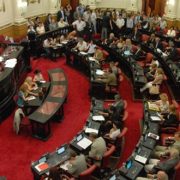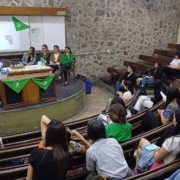WE SAY AGAIN: NO TO THE BASE LAW
On Thursday, April 25, the plenary session of the Budget and Finance, General Legislation and Constitutional Affairs Committees of the Chamber of Deputies reached the opinion on the new law of Bases and starting points for the freedom of Argentines (former omnibus law) . Today, Monday, the law will be discussed in the chamber, together with the so-called “Fiscal Package”, the law on Palliative and Relevant Fiscal Measures, which introduces modifications to the tax regime. From Fundeps, we once again say #NoALaLeydeBases, because:
“Below, we offer a google translate version of the original article in Spanish. This translation may not be accurate but serves as a general presentation of the article. For more accurate information, please switch to the Spanish version of the website. In addition, feel free to directly contact in English the person mentioned at the bottom of this article with regards to this topic”.
- Its treatment and approval in Commissions was in accelerated times. And the debate process was not open or participatory. In this way, a broad and specific discussion of each of the topics addressed was not allowed.
- It allows institutions such as CONICET, the National Securities Commission, the Financial Information Unit, ANMAT, INTA, INCUCAI, INCAA, Enacom, CONEAU, among others, to be intervened, split, partially dissolved or lose functions and powers. other decentralized or centralized organizations.
- Depending on these powers, and by not being explicitly excluded from the list, it could affect the operation of the National Genetic Data Bank (BNDG), which allows the identification of the grandsons and granddaughters that the Grandmothers of Plaza de Mayo have been looking for since the dictatorship. ; and the National Administration of National Parks (ANP), putting our protected areas at risk.
- It introduces modifications to the pension regime, which in a context of extensive labor informality, means that 9 out of 10 women will not be able to retire at age 60 and will have to wait until age 65 to access a Universal Benefit for the Elderly (PUAM), and that 7 out of 10 men will also not be able to retire at age 65, having to opt for a non-contributory pension or a proportional retirement.
- The fiscal package introduces the elimination of the Social Monotribute, which was a category designed to promote the formalization of lower-income sectors. This measure could affect more than 600,000 workers.
- The labor reform, in line with the chapter of DNU 70/2023 that was judicialized, implies an enormous reduction in rights, since it encourages unregistered work by eliminating fines and compensation, extending the trial period, among other measures.We insist that this project, even with the modifications that were made from February to today, must have greater public debate and cannot be approved. It affects the rights of workers, deepens gender inequalities, attacks the protection of nature, puts the science and technology system at risk; and subjects several public companies to privatization processes, which are strategic for the development of our country and the defense of sovereignty.
Contact
Mayca Balaguer, maycabalaguer@fundeps.org











